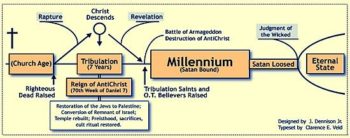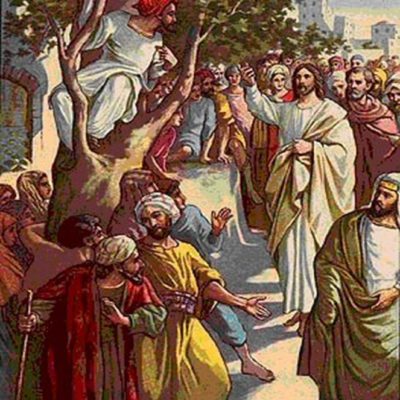Dispensationalism

Introduction: Dispensationalism is a system or method which attempts to define how God carries out for His purposes towards men. Adherents have calculated that there are three dispensations, which are the Patriarchal (that which is most powerful), the Mosaic (or Jewish), and Christianity. The key principles of Dispensationalism are the belief that there is a distinction between what God has planned for Israel and what God has planned for the Church. Dispensationalists use the literal principle of interpretation. They believe the purpose of God is for His own glory rather than the salvation of mankind.
Strong’s Hebrew Lexicon defines “Dispensation” as 3622. Administration (of a household or estate); specifically, a (religious) “economy”: dispensation, stewardship.
The Bible refers to dispensation four times in the New Testament. It is used by Paul to refer to the arrangement of redemption according to Gods plans…
“For though I preach the gospel, I have nothing to glory of: for necessity is laid upon me; yea, woe is unto me, if I preach not the gospel! For if I do this thing willingly, I have a reward: but if against my will, a dispensation of the gospel is committed unto me.” (1 Corinthians 9:16-17 ).
“That in the dispensation of the fulness of times he might gather together in one all things in Christ, both which are in heaven, and which are on earth; even in him:” ( Ephesians 1:10 ).
“If ye have heard of the dispensation of the grace of God which is given me to you–ward:” (Ephesians 3:2).
” Whereof I am made a minister, according to the dispensation of God which is given to me for you, to fulfil the word of God;” ( Colossians 1:25 ).
The Biblical use of the word “dispensation” was changed when it became “Dispensationalism” as defined by adherents. Dispensationalism is a complicated system that promotes certain theological assumptions that are unconnected to the Bible. It is also a system for reading Scripture.
Historically, Dispensationalism is a form of Premillennialism (which is the belief that Jesus Christ will return to earth for the Last Judgment just before the one-thousand-year reign of peace (millennium) mentioned in the Bible) which originated among the Plymouth Brethren in 1830. It is a system of Bible interpretation which was built on the idea that God administrated a plan for the world. The Dispensationalists see the world as a household that is administered by God with phases of revelation about the stewardship or the rules of life for the working of the purpose of God.
The premillennial Dispensationalists believe the Church will end in judgment and the historical kingdom of Christ on the earth will be established in a future millennium. There are many Theologians who suggest there are different periods that are marked off in Scripture by some kind of change in the way God deals with mankind. They believe each dispensation should be regarded as a new test of the natural man regarding sin, and the responsibility of man regarding sin. Each test ends in judgment, which makes man a failure in every dispensation. The Dispensational theology teaches that God has two plans for the salvation, one for Israel and one for the Church.
The Dispensationalists teach seven dispensations:
The Innocence before the fall; The Conscience from the fall to the flood; The Human Government from Noah to Abraham; The Promise from Abraham to Moses; The Law from Moses to Christ; The Grace which is the church age; and The Kingdom including the Divine Government.
The Dispensationalism system was based on the principle that God had two completely different plans which consisted of one for Israel, which were considered the earthly people, and one for the church, which were considered the heavenly people. This distinction between Israel and the Church was based on the Biblical interpretation of the basic purpose of God in all His communications with mankind so He could be glorified through salvation.
The Dispensationalists taught that the Church came about because Israel rejected the Kingdom that Christ offered. According to the Dispensationalists, God then postponed His timetable for the Jews to end after the sixty ninth week predicted in the book of Daniel. They profess that God then began to build a new and heavenly people which was the Church.
The Dispensational system teaches that the Church did not come into existence until Pentecost. The Dispensationalists teach that Christ came to fulfill the material promises and blessings of God to the earthly kingdom, Israel, but He was rejected causing the prophetic clock to be stopped by God and initiated His establishment of the church. They believe this clock will not be started again until the rapture of the church, when God will restart the purpose for His earthly people, Israel. They believe the church, (as the heavenly kingdom because the church is the body of Christ), must be Raptured out of the earth so the earthly program between God and Israel can resume.
The Dispensationalists teach Christ went to the Cross to bring salvation to the Gentiles and to create the Church. They believe the prophecies for Israel are not fulfilled in the Church and that is why the Church must be Raptured. They claim the Second Coming of Christ will take place at two different times. The first they claim will occur before the Tribulation Period, (which is the 70th week of Daniel the prophet), when Christ will return in the air for His saints to catch the Church up into Heaven. God will then continue the Tribulation for the Jews including the antichrist, the bowls of wrath, the marking of the 144,000 Jews, the preaching of the Gospel of the Kingdom and then Armageddon. They then believe Christ will return a second time with His saints to set up His earthly Kingdom to rule Israel and the world.
History
Theologians have argued over the history of Dispensationalism. There is disagreement to the establishment of belief, with some arguing that it was held by the apostles and the first generation churches, and some supporting the theory that it was a new theology that originated in the 19th century. They do agree it began to take form in the middle of the 1800 and there is a mutual agreement that it came out of the Brethren movement.
John Nelson Darby (born in 1800 and died 1882) was credited with the beginning of the systematic method of Dispensationalism. He was a minister of the Plymouth Brethren and came to believe in a future salvation and restoration of the nation of Israel while at Trinity College in Dublin Ireland in 1819. It was through his studies of Isaiah 32 that brought him to conclude that Israel, in a future dispensation, would have earthly blessings that would be different from the heavenly blessings that the church would experience. John Nelson Darby also believed there would be a millennial kingdom where God would fulfill these unconditional promises with Israel. Darby believed there were seven dispensations set forth by God which included the condition that existed to the flood; Noah, Abraham, Israel, the Gentiles, the Spirit, and the Millennium. John Nelson Darby theology was completely formed by 1833.
The Brethren Movement in the early 19th century was the next addition to Dispensationalism in Britain. The Brethren Movement rejected the special role for ordaining clergy and stressed the spiritual giftedness of the ordinary believers. They believed they had the freedom, under the guidance of the Holy Spirit, to teach each other from Scripture. This Movement had an extensive impact on the evangelical Protestantism and it influenced ministers throughout the United States as well as Great Britain.
The Bible conference Movement in 1870 started springing up in different parts of the United States. The ideas of Dispensationalism were spread through these Bible conferences. It was at the American Bible and Prophetic conferences held from 1878 to 1914 that promoted a dispensational theology.
The Bible Institute Movement happened in the late 1800’s when the many Bible Institutes were founded and began teaching the Dispensational theology. The first of these Bible Institutions was the Nyack Bible College which was founded in 1882 in New York City, New York by the missionary Dr. A.B. Simpson. as the first Bible College in America which focused on missionary training.
The second Bible Institute to teach this theory was the Moody Bible Institute, known as the Chicago Evangelization society, was founded in 1886 to educate and train Christian workers, teachers, ministers, missionaries to proclaim the gospel of Jesus Christ. The founder was D.L. Moody.
The last school noted as being part of the Bible Institute Movement was The Boston Missionary Training School founded in 1889. It was originally founded by Reverend Adoniram Judson Gordon and was called the Gordon Divinity School, which was established to equip men and women in practical religious work and furnish them thoroughly in Biblical training. It was based in Boston, Massachusetts and called the Boston Bible and Missionary Training School. The school merged with the Conwell School of Theology and became the Gordon-Conwell Theological Seminary in 1969.
Cyrus Ingerson Scofield and the Scofield Reference Bible formed a board of Bible Conference teachers in 1909 and they produced the Scofield Reference Bible. This reference Bible has become the greatest influence in the spread of Dispensationalism. Cyrus Ingerson Scofield was born 1843 and died in 1921. He was privately educated and ordained to the congregational ministry in 1882. He pastured the First Church, Dallas Texas from 1882 until 1895 then from 1895-1902 served as minister at the Moody Church in Northfield, Massachusetts. He is best known for his dispensational premillennial Scofield Reference Bible.
The Dallas Theological Seminary – There were many dispensational Bible schools formed after World War I. The Dallas Theological Seminary founded in 1924 was among the first to promote Dispensationalism in an academic setting. The Dallas Theological Seminary is a conservative evangelical theological Seminary. It was founded by Lewis Sperry Chafer. Chuck Swindoll became president in 1994.
The Dispensationalists of 1970 wrote novels promising end times. Hal Lindsey wrote the Late Great Planet Earth, and in the book suggested the European common Market might be the realm of the coming antichrist. The threat of Russia, identified in his book as Gog, and Moscow, identified as Magog, also played a part, with the fire and brimstone as the code for a coming nuclear detonation.
There have been movies produced about the Rapture, the Jews, and the antichrist. These films have been distributed among the Christian youth groups and at prophecy conferences with the warning of not being left behind, and the promise of Rapture if the repentant turned to Christ. 1993 dispensationalist evangelical author Timothy La Haye, and Jerry B. Jenkins wrote the popular Left Behind series of fictional books, and are doing their part in keeping Dispensationalism alive and well.
Cite Article Source
MLA Style Citation:
Holstein, Joanne “Dispensationalism:.” Becker Bible Studies Library Jan 2006.<https://guidedbiblestudies.com/?p=2552,>.
APA Style Citation:
Holstein, Joanne (2006, January) “Dispensationalism:.” Becker Bible Studies Library. Retrieved from https://guidedbiblestudies.com/?p=2552,.
Chicago Style Citation:
Holstein, Joanne (2006) “Dispensationalism:.” Becker Bible Studies Library (January), https://guidedbiblestudies.com/?p=2552, (accessed).

